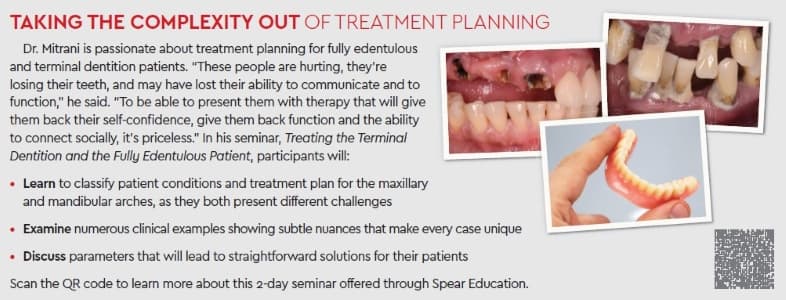Spear helps dentists build confidence in treatment planning, learn from failure, and connect with a supportive community that drives lasting growth
The Freedom to Fail
Many years ago, while studying at the National Conservatory of Music in Mexico City, Dr. Mitrani had a teacher he said drained his passion for music by failing to encourage him in the right way. That experience, he said, is why success ultimately comes down to mindset.
"I hear all the time from dentists saying, 'I experienced failure doing endo. I'm never doing endo again,’ he shared. "When you throw out the word 'never,' it's so limiting."
That brings Dr. Mitrani to another point: "There are certain things that dental school doesn’t teach us, but they’re fundamental in being a clinical dentist."
•1) Failure is a possibility. "When you’re taught in a way that you cannot fail, you become increasingly insecure," he said. "There’s nobody out there who doesn’t fail. Failure is human."
•2) How to be a team player. "When you run a practice and work in an interdisciplinary fashion, you need to master the game of being a team player," Dr. Mitrani noted. "If you run a practice, you’ve got to understand that you will lead a team. Before Spear, nobody taught me how to become a leader, and I made a lot of mistakes. So, I want to make sure dentists can learn from those mistakes, because they are universal.”
A Pathway to Proficiency
Designed for dentists in their first 5 years of practice, the Spear Foundations membership provides early-career dentists with targeted clinical pathways, an on-demand CE library, and access to the Spear Talk community, where they can connect with mentors and peers and participate in faculty-led discussions.
“We want to make sure that young dentists are equipped with the right pathways and guardrails that allow them to feel surer about themselves, and more importantly, to enjoy the ride,” said Dr. Mitrani. “There's nothing more demoralizing than experiencing failure without being contained by a community."
Leaning into Compassion
Dentistry is an emotionally demanding career. Patients often arrive fearful or in pain, and providers may naturally absorb some of that stress. Without healthy ways to manage it, these challenges can affect long-term satisfaction with the profession.
“If we're compassionate with our patients," said Dr. Mitrani, “it builds on a reward pathway in our brains that allows us to feel better about what we're doing instead of feeling guilty or insecure."






